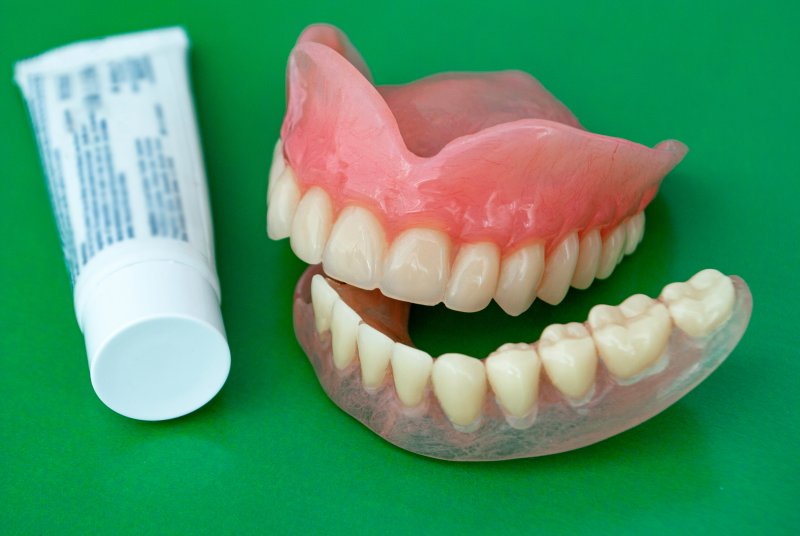A Gripping Debate: Which Denture Adhesive is Best?
May 8, 2025

Traditional dentures are some of the most popular and widely used forms of tooth replacement in the world. Their natural-looking appearance and improved durability make them ideal for those who prefer to avoid invasive treatment but still desire a healthier, beautiful, and fully functional smile. However, one thing patients often rely on is denture adhesive. With so many options available at local drugstores, how can a person know which one to choose? If you find yourself asking the same question, read on to discover how powders, creams, and strips work so that you can decide which one is right for you.
Why is Denture Adhesive Used?
Although it’s not necessary for patients with dentures, adhesives are commonly used to help keep these removable teeth in place.
Unlike partial dentures that attach to natural teeth with clasps or clips, full dentures have nothing to “hang onto.” Instead, natural suction is the only thing that keeps them from slipping. While these prosthetics are crafted to fit snugly against the gums, many individuals find it helpful to apply a small amount of denture adhesive to ensure greater security, especially when eating or speaking.
Which Types of Denture Adhesives Are Used?
Generally, there are three types of denture adhesives a person can choose from: creams, pastes, or strips. They all work differently but maintain the same goal, which is to keep dentures in place and prevent slipping.
Creams
Many brands on the market produce denture creams. Delivered in tubes, an individual is instructed to only use a small amount at various points along the undersides of the denture (this is the area that rests against the gums). The cream should be applied while the prosthetic is wet to ensure better attachment. This type of adhesive is strong, so it can hold dentures in place, as well as reduce gum irritation.
Powders
A less common option is denture powders. Designed to be sprinkled onto wet dentures, this method covers the entire area that meets with the gums (unlike creams, which are applied only in certain areas). Those who prefer powders often do so because they can be easier to attach to the gums as long as they fit snugly and properly. Similar to creams, powders offer a strong hold throughout the day, but these products can better seal and protect against food debris getting trapped underneath.
Strips
Denture strips can be a better option if a person’s dentures do not fit as well as they should. They work best when teeth are dry and can be applied as one long strip or in multiple smaller sections. It’s important to remember that if artificial teeth are not providing the reliable fit you need, it’s best to contact your dentist to discuss ways to address the problem.
Now that you know a bit more about each type of denture adhesive, you can determine which is a better option for your smile. However, if you still have questions, never hesitate to contact your dentist for further information.
About the Author
Dr. Aaron Springhetti earned his dental doctorate at the University of Louisville School of Dentistry and has extensive training in oral surgery. He enjoys providing his patients with a more convenient approach to tooth replacement, which is why he offers different methods of treatment, one of which is dentures. Apart from ensuring a comfortable fit, he also provides patients with helpful tips regarding various products they can use to improve security and confidence while wearing these prosthetics. If you want to know which adhesive works best in holding dentures in place, contact us at (317) 875-7645.
No Comments
No comments yet.
RSS feed for comments on this post.
Sorry, the comment form is closed at this time.

